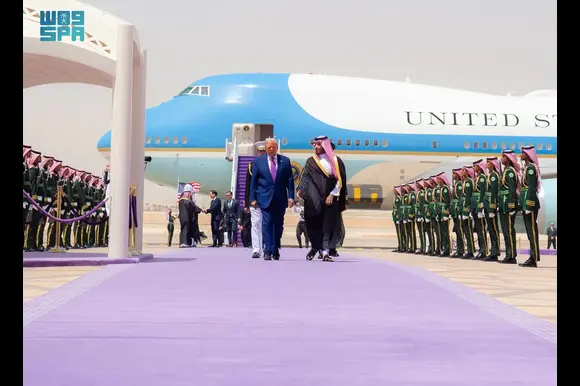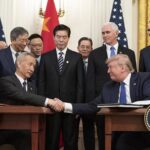US President Donald Trump launched a four-day visit to the Middle East on Tuesday, with Saudi Arabia as his first stop. The trip aims to underscore economic cooperation with a key ally while ongoing concerns about Iran’s nuclear ambitions and the persistent war in Gaza remain pressing in the background.
Trump was warmly received by Crown Prince Mohammed bin Salman upon landing at King Khalid International Airport in Riyadh. The two leaders retreated to a reception hall, where Trump and his delegation were served traditional Arabic coffee by attendants in ceremonial attire. “I really believe we like each other a lot,” Trump said during a joint appearance with the crown prince ahead of a bilateral meeting.
The visit underscores deepening ties between Washington and Riyadh. Prince Mohammed has already committed to investing approximately $600 billion in the United States, while Trump floated the idea of increasing that figure to $1 trillion. The arrival of Air Force One was marked by a symbolic escort from Royal Saudi Air Force F-15 fighter jets.
At the Royal Court, Trump and the crown prince participated in a luncheon attended by key guests and advisors in an ornate hall adorned with blue detailing and glittering crystal chandeliers. Business magnates including Blackstone CEO Stephen Schwarzman, BlackRock CEO Larry Fink, and Tesla and SpaceX CEO Elon Musk were also present. Prince Mohammed appeared in high spirits, engaging actively with the attendees.
The warm reception contrasted sharply with the muted welcome extended to President Joe Biden during his 2022 visit. Biden’s trip aimed at curbing rising fuel prices, but was marred by controversy surrounding the 2018 murder of journalist Jamal Khashoggi, which US intelligence linked to the crown prince. During Biden’s visit, he notably avoided a handshake with the prince, opting instead for an awkward fist bump.
Later on Tuesday, Trump is scheduled to attend a US-Saudi investment forum and will be honoured at a formal dinner hosted by Prince Mohammed. The Saudi government, alongside other OPEC+ members, had recently increased oil production, helping Trump keep energy prices low — a key priority in his efforts to reduce inflation and stabilize the American economy. Trump has argued that lower global oil prices could accelerate a resolution to the Russia-Ukraine conflict.
However, analysts caution that Saudi Arabia’s economy remains heavily reliant on oil revenue. The kingdom reportedly needs oil prices between $96 and $98 per barrel to balance its national budget. On Monday, Brent crude was trading at just $64.77 per barrel, raising questions about the sustainability of current production levels.
According to Jon Alterman, a senior Middle East analyst at the Center for Strategic and International Studies in Washington, lower oil prices challenge Gulf nations’ economic diversification plans, even if they don’t derail them entirely.
Trump’s itinerary also includes Qatar and the United Arab Emirates — countries where the Trump Organization is developing real estate projects. These include a high-rise in Jeddah, a luxury hotel in Dubai, and a villa and golf complex in Qatar. Riyadh was also the first foreign destination of Trump’s first term.
While Trump touts the transactional nature of his foreign policy as yielding tangible economic returns, critics — particularly from the Democratic Party — argue that his global tariff policies and approach to conflicts like the war in Ukraine are isolating the US from its traditional allies.
During this trip, Trump is expected to announce a range of new agreements with Saudi Arabia, Qatar, and the UAE. These are likely to include partnerships in artificial intelligence, expanded energy cooperation, and potentially new arms sales. Earlier this month, the administration approved a $3.5 billion sale of air-to-air missiles to Saudi Arabia.
Despite his regional diplomacy push, Trump’s ties with Israel appear strained. Notably, his itinerary does not include a stop in Israel — a significant departure from past precedent. Before departing for Saudi Arabia, Trump announced the suspension of a US airstrike campaign against Yemen’s Houthi rebels, citing their pledge to cease attacks on maritime trade routes. The decision was made without notifying Israel, a nation directly affected by Houthi hostilities.
This pattern has repeated in Trump’s approach to Israel: in March, Israeli Prime Minister Benjamin Netanyahu was reportedly unaware of US-Hamas ceasefire talks until after they had begun, and Trump disclosed ongoing nuclear negotiations with Iran only during Netanyahu’s Oval Office visit.
“Israel will defend itself by itself,” Netanyahu declared after learning of the US-Houthi truce. “If others join us — our American friends — all the better.”
William Wechsler of the Atlantic Council’s Middle East Programmes called Trump’s exclusion of Israel from the trip “remarkable,” observing that Gulf governments currently appear to hold stronger relations with the Trump administration than Israel does.
Trump is also reviving his earlier effort to normalize relations between Israel and Saudi Arabia. His Abraham Accords initiative previously led to diplomatic breakthroughs between Israel and several Arab states, including the UAE, Bahrain, Morocco, and Sudan. However, Saudi Arabia has set firm conditions for normalisation — including US security guarantees, support for a civilian nuclear programme, and meaningful progress on the creation of a Palestinian state.
Achieving those conditions appears increasingly unlikely as the war in Gaza continues. Israel has shown no signs of slowing down its military operations, and tensions remain high. Nevertheless, Saudi Arabia recently hosted Palestinian Vice President Hussein al-Sheikh in Jeddah — his first foreign visit since assuming office — signalling the kingdom’s ongoing interest in the Palestinian cause.
Hussain Abdul-Hussain of the Foundation for Defense of Democracies noted that Prince Mohammed may be signaling to Trump that a deal with Israel hinges on visible progress toward Palestinian statehood.
As Trump seeks to leverage economic diplomacy to bolster his foreign policy credentials, the Middle East remains a region of high stakes and complex alliances.






